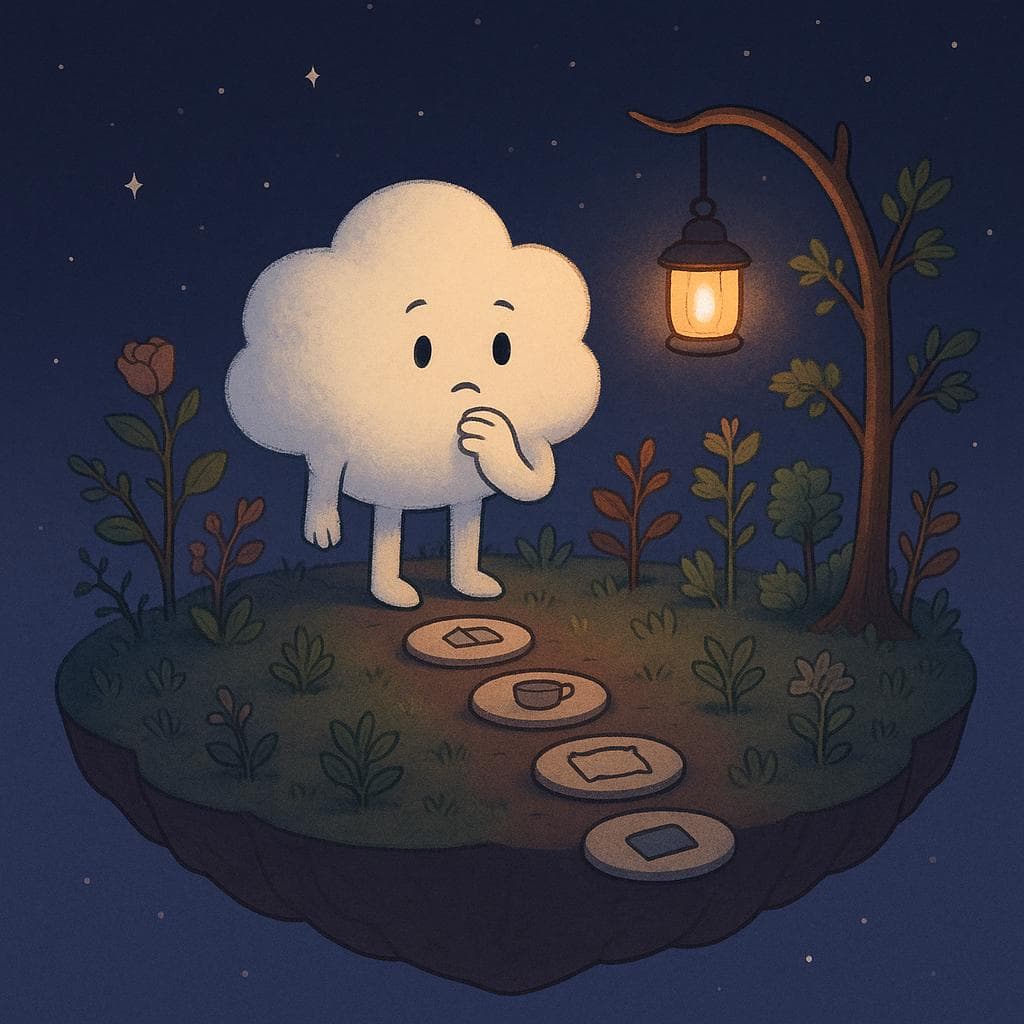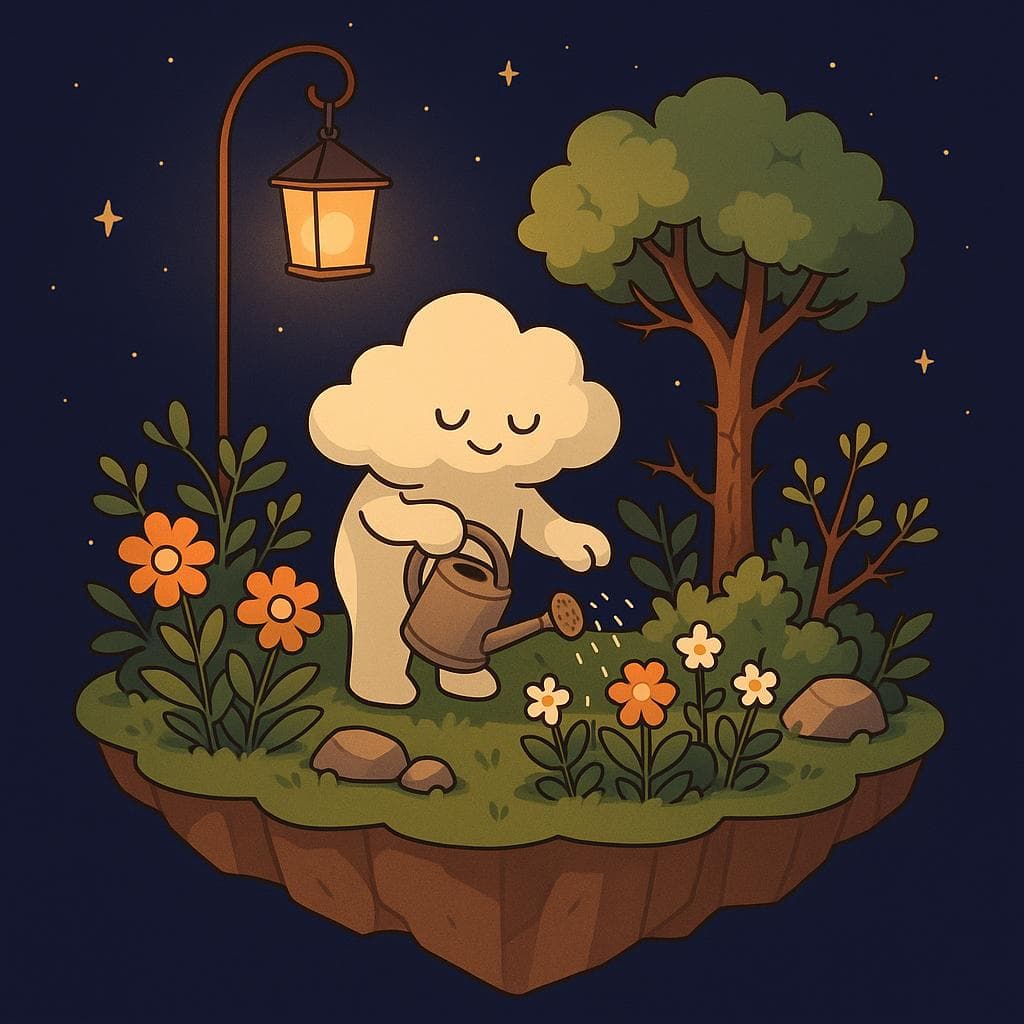How to Rest When You Feel Guilty About Resting
You finally sit down after a long day, open TikTok “just for a second”…and suddenly your brain starts yelling:
- “You didn’t do enough.”
- “You should be studying.”
- “Other people are grinding right now.”
So you keep scrolling, half-resting, half-hating yourself, and fully not recharging.
If resting makes you feel guilty, lazy, or behind, you’re not alone. College culture, hustle culture, and perfectionism all teach you that you have to earn rest—and most of us never feel like we’ve done enough to deserve it.
This guide is here to help you understand why rest feels so uncomfortable and how to build a rest routine that your brain will actually accept.
Key Takeaways:
✓ Rest guilt is a learned response from hustle culture, school pressure, and perfectionism—not proof that you’re lazy or “bad at life”
✓ Your brain and body literally need downtime for focus, memory, and emotional regulation, especially if you live with anxiety or ADHD
✓ Tiny, “pre-approved” rest blocks (5–10 minutes with clear start/end) make it easier to relax without spiraling about productivity
✓ Naming the guilt, reframing your thoughts, and using tools like mood journaling or habit tracking can slowly retrain your brain to see rest as fuel, not failure
✓ You don’t need perfect routines—a few small, repeated rest rituals can become a gentle self-care routine that actually sticks over time
1. Why Rest Feels So Hard
You probably already know rest is important. Your body knows. Your brain knows. But the second you slow down, the guilt kicks in. Let’s name what’s going on.
Hustle culture in your head
From high school on, you’re told:
- “You need good grades to get into college.”
- “You need internships to get a job.”
- “You need a side hustle to stand out.”
College surveys show that over 60% of students meet criteria for at least one emotional challenge during the school year (APA, 2022). At the same time, about two-thirds of students don’t use campus wellness resources at all (American Psychiatric Association, 2023). Translation: a lot of people are exhausted and pushing through it alone.
So when you try to rest, your brain is still running the “never enough” script.
Example:
You tell yourself, “I’ll just watch one episode to relax,” but the whole time you’re thinking about the assignment you could be working on. When the episode ends, you don’t feel rested—you just feel behind.
That’s not your fault. You were trained to see rest as something you get after productivity, not something that supports it.
ADHD, anxiety, and rest guilt
If you live with ADHD, anxiety, or both, rest can feel especially confusing:
- ADHD can make time feel slippery—either “now” or “not now.” So resting feels like you’re losing time you’ll never get back.
- Anxiety whispers that if you stop, everything will fall apart.
- Low mood tells you that you should be doing more, even when you’re already exhausted.
Research shows untreated anxiety in Gen Z is linked to academic decline and sleep disturbance (Parents Magazine, 2025). And chronic sleep issues in teens are tied to more mood swings and emotional reactivity (National Sleep Foundation, 2024). Rest isn’t extra—it’s literally part of how your brain stabilizes.
You’re not broken, the system is
You’re trying to grow in a system that rewards overwork, punishes slowing down, and measures your worth by output. No wonder rest feels wrong.
You’re not bad at resting. You’re just running a script that was never written with your wellbeing in mind.

2. What Rest Actually Does For You
To quiet guilt, it helps to know what rest is for—beyond “because people say it’s healthy.”
Rest is maintenance, not a reward
Think of your brain like a laptop. If you never close tabs, update apps, or plug it in, it doesn’t “power through”—it overheats, lags, and crashes.
Rest is:
- When your brain consolidates memories
- When your nervous system comes down from constant “fight or flight”
- When your emotions finish processing instead of getting shoved into “deal with later”
Studies show that nearly 80% of teens who earn a high grade on healthy sleep behaviors are free of significant depressive symptoms (National Sleep Foundation, 2024). Sleep is just one type of rest, but it proves the point: recovery time literally changes how you feel.
Different types of rest
If “rest” to you just means “lie in bed and scroll,” your brain might not be getting what it needs. There are different “flavors” of rest:
| Type of Rest | What It Helps With | Tiny Examples (5–10 min) |
|---|---|---|
| Physical | Body tension, fatigue | Stretching, lying down with eyes closed |
| Mental | Brain fog, overthinking | Staring out a window, doodling, daydreaming |
| Emotional | Feeling drained or numb | Journaling a few lines, crying, music |
| Social | People-pleasing exhaustion | Solo walk, saying no to one invite |
| Sensory | Overstimulation | Quiet room, dim lights, no notifications |
You don’t need all of these every day. But noticing which type you’re missing can make rest feel more purposeful and less “lazy.”
Rest makes you more effective
Your guilt says, “If I rest, I’ll get less done.” Reality is usually the opposite.
- With enough rest, it’s easier to focus for 30 minutes.
- Without it, you can “work” for three hours and barely remember what you did.
If you struggle with ADHD focus, strategic breaks can actually be one of your best productivity tools. We break this down more in our guide on building a wellbeing routine that actually sticks.
Rest is not the enemy of productivity. It’s the power source.
3. Naming And Untangling Rest Guilt
You can’t fix what you can’t see. Step one is noticing how your guilt talks to you.
Spot your guilt scripts
Common guilt thoughts:
- “I didn’t do enough today to rest.”
- “Other people are working harder than me.”
- “If I stop now, I’ll fall behind.”
- “I’m just avoiding things.”
Try turning these into simple “scripts” you can catch:
Example:
Script: “If I’m not exhausted, I don’t deserve a break.”
Reframe: “Rest prevents exhaustion. I don’t have to hit empty to refill.”
You don’t have to fully believe the reframe yet. The goal is just to introduce another option.
Use a tiny CBT-style check
Some of the most effective therapy approaches for anxiety use CBT skills like noticing thoughts and gently challenging them (APA/CBT practice guides, 2022–2025). You can borrow a tiny version of that:
-
Catch the thought
“I’m lazy for wanting to rest.” -
Check the evidence
- What did I actually do today? (Even small things count.)
- Am I tired, overwhelmed, in pain, or emotionally drained?
-
Choose a kinder thought
- “My body is asking for a break.”
- “Rest is part of getting things done, not the opposite of it.”
You can write this in a quick mood journal or notes app. It doesn’t have to be deep. One or two lines is enough.
Separate identity from energy
Rest guilt often blends “I feel tired” with “I am lazy.”
Try this shift:
- Instead of: “I’m unmotivated.”
- Try: “My energy is low right now.”
One describes your entire identity. The other describes your current state—something that can change.
Example:
“I’m so behind” becomes “My schedule is overloaded for one person. No wonder I’m tired.”
That tiny language shift is you tending to yourself instead of attacking yourself.
4. Tiny Rest Rituals That Don’t Trigger Panic
Now let’s talk about how to rest when your brain fights you on it. The trick is to make rest:
- Small
- Time-bound
- Clearly “allowed”
Strategy: Pre-approved rest blocks
Instead of vague “I’ll rest later,” try scheduling tiny rest blocks like appointments.
- Pick a short window: 5–15 minutes.
- Decide the activity ahead of time.
- Set a timer so your brain knows there’s an end.
Example:
“At 4:30, I’m taking a 10-minute break to lie on my bed, phone on Do Not Disturb, listening to one playlist. When the timer ends, I’ll stand up and decide my next step.”
This helps your anxious brain chill because:
- The rest is planned, not “slacking.”
- There’s a clear stop time.
- You’re choosing it on purpose.
5 tiny rest ideas (1–10 minutes)
You don’t need a full spa day. Start here:
-
Wall stare + breathing (2 minutes)
Sit, look at a blank wall or out a window, and do 10 slow breaths. That’s it. -
Body scan in bed (5 minutes)
Lie down, notice each part of your body from toes to head, and consciously soften what you can. -
Sensory reset (3 minutes)
Turn off overhead lights, silence notifications, and sit in quiet or with soft music. -
Micro-nap (10–15 minutes)
Set a short timer, close your eyes, and just rest. You don’t have to fall asleep for it to count. -
Mini nature break (5 minutes)
Step outside, balcony or doorway counts, and look for three green things or three clouds.
These are “seed-sized” actions—small enough that your guilt has less to argue with, but still real rest for your nervous system.

5. Rest When You’re Anxious Or Low
Rest looks different when your brain is buzzing vs. when everything feels heavy.
When anxiety won’t let you stop
If you’re anxious, stillness can feel like being trapped with your thoughts. Try active rest instead of total stillness.
Active rest ideas:
- Slow walk around the block or hallway
- Gentle stretching with a YouTube video
- Coloring, simple crafts, or LEGO
- Light room reset: make your bed, clear your desk, then stop
This is still rest because the goal isn’t output—it’s soothing your system. If you’re looking for more tools on how to deal with anxiety, grounding activities like these can help.
When low mood makes you freeze
Low mood can make both work and rest feel impossible. You might end up in a stuck middle: not doing tasks, not truly resting, just scrolling and feeling worse.
When you’re here, think “maintenance mode,” not “glow up.”
Try:
- Lying down with no screens for 5 minutes
- Putting on one comfort show episode on purpose
- Taking a warm shower and changing into clean clothes
- Drinking water while sitting in silence for a few breaths
Behavioural activation—scheduling small, meaningful activities—is a proven way to ease depressive symptoms by increasing positive reinforcement (APA, 2023). Your micro-rest counts as one of those activities.
We go deeper into this in our piece on when you’re feeling too low to do basic self-care.
When you can’t afford therapy (but need support)
If you’re thinking, “I probably need help but I can’t afford therapy,” you’re in a huge group. Many young people who want care don’t get it due to cost or access (CDC, 2025; Trevor Project, 2023).
While therapy is powerful, it’s not the only support:
- Campus counseling (often free or low-cost)
- Peer support groups or student orgs
- Guided journaling, CBT-style prompts, or wellness apps as a therapy alternative
- Professors or advisors who are open to extensions and accommodations
Rest gets easier when you’re not carrying everything alone. Reaching out is also a form of tending to yourself.
6. Building A Rest-Friendly Routine
You don’t need a 20-step self care routine. You need a few repeatable moments that tell your brain, “Rest is safe. Rest is allowed.”
Start with one anchor
Pick one daily rest anchor you can attach to something you already do.
Examples:
- After your first class, 5 minutes of sitting outside
- After dinner, 10 minutes of low-stimulation time (no schoolwork, no loud content)
- Before bed, 3 lines in a mood journal and one stretch
Keep it so small that it almost feels silly. That’s good. Silly is sustainable.
Track rest as a real habit
Your brain is wired to notice what went wrong, not what went well. Habit tracking can hack that.
Instead of only tracking “productive” things (study hours, workouts), try tracking:
- “Took a 5-minute rest break”
- “Logged off by midnight”
- “Did one gentle thing for my body”
You can do this on paper, in your notes app, or with a wellness tracker. Seeing those little checkmarks adds a bit of dopamine your tired brain might be missing.
Use a simple “rest menu”
Decision fatigue is real. When you’re exhausted, choosing how to rest can be one more task.
Create a mini “rest menu” with 3–5 options you know help:
| Time You Have | Rest Option A | Rest Option B |
|---|---|---|
| 2 minutes | 10 deep breaths | Stare out window |
| 5 minutes | Stretch + water | Lie down, eyes closed |
| 10–15 minutes | Short walk | One episode / chapter |
When you notice yourself spiraling, pick from the menu instead of inventing something new.

7. Conclusion: Rest As A Way Of Tending
You don’t have to love resting yet. You don’t have to feel “worthy” of it. You also don’t have to earn it by burning yourself out first.
You can start much smaller:
- Notice one guilt thought and name it as a script.
- Try one 5-minute, pre-approved rest block today.
- Tonight, do one tiny thing that helps tomorrow’s you rest more easily (lay out comfy clothes, fill a water bottle, dim the lights earlier).
Think of rest like watering a plant. You don’t wait until it’s completely dried out and crumbling to give it water. You give it small, steady sips so it can keep growing.
Your brain and body deserve the same.
If you want a gentle way to turn these tiny rest rituals into visible progress, Melo Cares can help you tend to yourself—like a little wellness garden that grows every time you choose rest over burnout.
Note: This article is for general information and support only and isn’t a substitute for professional care. If rest, anxiety, or low mood are making daily life really hard for you, reaching out to a counselor, therapist, or trusted adult for more personalized support can be an important next step.
